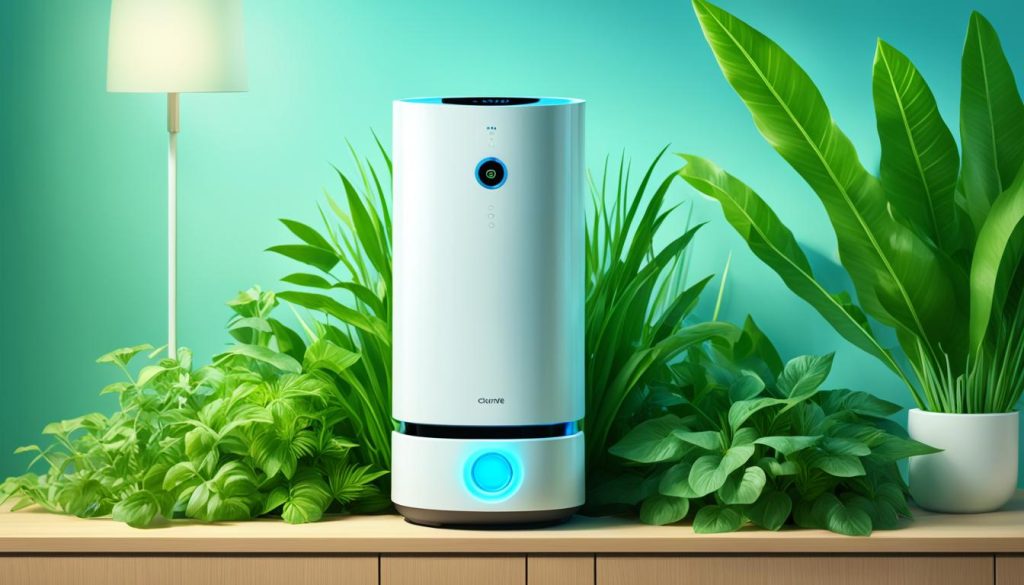As someone who cares about the environment and wants to make a positive impact, I have discovered several essential tips to improve environmental wellness and adopt a sustainable, eco-friendly lifestyle. By following these tips, I have not only reduced my carbon footprint but also practiced green living and made environmentally conscious choices that benefit both myself and the planet.
In this article, I will share these tips with you, so you can also take steps towards creating a healthier and more sustainable future. From replacing chemical cleaning products with natural alternatives to embracing nature and limiting screen time, these strategies are simple yet effective in promoting environmental wellness.
Key Takeaways:
- Incorporate natural alternatives into your cleaning routine to reduce the use of harmful chemicals.
- Improve indoor air quality by reducing allergens and investing in an air purifier.
- Declutter your living space to reduce stress and promote mental well-being.
- Embrace nature and limit screen time to connect with the environment and improve overall quality of life.
Replacing Chemical Cleaning Products with Natural Alternatives
One of the first steps you can take to improve environmental wellness is to replace chemical cleaning products with natural alternatives. Many conventional cleaning products contain harmful chemicals that can be toxic to both your health and the environment. Instead, opt for natural alternatives such as baking soda, vinegar, lemon juice, and essential oils to create eco-friendly and effective cleaning solutions. These natural cleaning products are safe, non-toxic, and better for both you and the planet.
Benefits of Natural Cleaning Products
Natural cleaning products offer a wide range of benefits for both your home and the environment. Here are a few reasons why you should consider making the switch:
- Eco-friendly: Natural cleaning products are made from renewable resources and do not contain harmful chemicals that can pollute waterways and contribute to air pollution.
- Safe and non-toxic: Unlike chemical cleaning products, natural alternatives are safe to use around children and pets. They do not emit harmful fumes that can cause respiratory issues.
- Cost-effective: Most natural cleaning products are affordable and readily available. You can easily find them in your local grocery store or even make them at home using simple ingredients.
- Multi-purpose: Natural cleaning products can be used for various cleaning tasks. For example, vinegar can be used to remove stains, deodorize, and disinfect surfaces.
By switching to natural cleaning products, you can create a healthier and cleaner living environment while also contributing to a more sustainable future.
Reducing Allergens and Improving Indoor Air Quality

Indoor air quality plays a significant role in maintaining a healthy living environment. Poor air quality can lead to various health issues, particularly allergies and respiratory problems. To ensure a cleaner and healthier home, it’s crucial to focus on reducing allergens and improving indoor air quality.
Dust and other common allergens can accumulate in our homes and trigger allergies. To minimize these allergens, incorporate the following practices into your cleaning routine:
- Regularly clean and dust all surfaces, including furniture, shelves, and electronics, using a damp cloth or microfiber cloth to trap allergens effectively.
- Pay extra attention to hidden areas, such as behind furniture, under beds, and in corners, where dust tends to accumulate.
- Wash bedding, including sheets, pillowcases, and blankets, at least once a week in hot water to remove dust mites and other allergens.
- Keep windows open, if weather permits, to improve ventilation and reduce the concentration of indoor pollutants.
While implementing these cleaning practices is essential, investing in an air purifier can further improve indoor air quality. An air purifier filters out airborne particles, such as dust, pollen, pet dander, and mold spores, helping to create a cleaner and healthier living environment. Consider choosing an air purifier with HEPA (High-Efficiency Particulate Air) filters, as they effectively capture small particles and allergens.
Improving indoor air quality and reducing allergens in your home contributes to a healthier lifestyle, particularly for individuals prone to allergies or respiratory conditions. By adopting these practices and considering the use of an air purifier, you can create a safe and comfortable space that promotes overall well-being.
Decluttering for Mental Health and Stress Reduction

Decluttering your living space can have a profound impact on your mental health and stress levels. The state of our environment can greatly affect our overall well-being, and a cluttered space can contribute to feelings of overwhelm and anxiety. By taking the time to declutter and create an organized living space, you can experience a range of benefits that support your mental health and reduce stress.
When we declutter, we remove unnecessary items and create a sense of order and calm in our surroundings. This process not only creates physical space but also allows for mental clarity and focus. As we sort through our belongings and make decisions about what to keep and what to let go of, we begin to prioritize our needs and simplify our lives. This act of decluttering can be incredibly liberating, giving us a renewed sense of control and empowerment.
Additionally, decluttering provides an opportunity for introspection and self-reflection. As we assess our possessions, we gain insight into our values, priorities, and attachment to material things. Letting go of items that no longer serve us can be a freeing experience, enabling us to live more intentionally and authentically.
The benefits of decluttering extend beyond our physical environment. A clean and organized living space can improve our cognitive function by reducing distractions and allowing our minds to focus. It can also enhance our ability to relax and unwind, creating a peaceful sanctuary where we can recharge and rejuvenate.
Moreover, decluttering can have a positive impact on our relationships and social well-being. A clutter-free home is inviting and welcoming, making it easier to entertain guests and foster meaningful connections. By creating an environment that facilitates social interaction, we can strengthen our relationships and enhance our overall happiness.
To start the decluttering process, I recommend focusing on one area at a time. Whether it’s a drawer, a closet, or an entire room, breaking the task into smaller, manageable chunks can make it feel less overwhelming. As you sort through your belongings, ask yourself if each item brings you joy or serves a practical purpose. Be mindful of the emotional attachments you may have to certain items, but also consider the mental and emotional weight they may carry.
“The objective of cleaning is not just to clean, but to feel happiness living within that environment.” – Marie Kondo
As you declutter, remember that the process is not about perfection, but rather about creating a space that aligns with your values and promotes your well-being. Allow yourself to let go of the unnecessary and embrace the freedom that comes with a decluttered home. Your mental health and stress levels will thank you.
Embracing Nature and Limiting Screen Time
To enhance environmental wellness, it is essential for me to embrace nature and limit my screen time. I understand that spending time outdoors has numerous benefits for my mental and physical well-being. Not only does it reduce stress and improve my mood, but it also boosts my self-esteem.
One way I can incorporate nature into my daily life is by bringing it into my home environment. I can add houseplants, which not only beautify my space but also purify the air. Using natural materials in my decor, such as wooden furniture and organic fabrics, can also create a connection with nature. Additionally, I can display photos or paintings of natural landscapes to remind me of the beauty and tranquility of the outdoors.
Another crucial step in improving my environmental wellness is reducing my screen time. I am aware that excessive screen time can have negative effects on my well-being, such as eye strain, sleep disturbances, and decreased productivity. Therefore, I will set boundaries for myself and take regular breaks from screens. During these breaks, I will engage in outdoor activities or pursue screen-free hobbies, such as reading, gardening, or practicing yoga. By making a conscious effort to connect with nature and reduce my screen time, I can improve my environmental wellness and overall quality of life.
FAQ
How can I improve environmental wellness and adopt a sustainable lifestyle?
To improve environmental wellness and adopt a sustainable lifestyle, you can follow several essential tips. These include replacing chemical cleaning products with natural alternatives, reducing allergens and improving indoor air quality, decluttering for mental health and stress reduction, and embracing nature while limiting screen time.
What are some natural alternatives to chemical cleaning products?
Natural alternatives to chemical cleaning products include baking soda, vinegar, lemon juice, and essential oils. These ingredients can be used to create eco-friendly and effective cleaning solutions that are safe for both your health and the environment.
How can I reduce allergens and improve indoor air quality in my home?
To reduce allergens and improve indoor air quality, you can keep your home clean and dust-free, wash your bedding regularly, improve ventilation by opening windows, and invest in an air purifier. These measures can help remove allergens from the air and create a healthier living environment.
How does decluttering contribute to mental health and stress reduction?
Decluttering your living space can contribute to mental health and stress reduction by creating an organized home environment. A cluttered space can increase stress levels and make you feel overwhelmed. By sorting through your belongings, getting rid of items you don’t need or use, and creating a clean and organized living space, you can promote a sense of calm and reduce stress.
How can I embrace nature and limit screen time for improved environmental wellness?
To embrace nature and limit screen time for improved environmental wellness, you can incorporate nature into your home environment by adding houseplants, using natural materials in your decor, and displaying photos or paintings of natural landscapes. Additionally, you can limit your screen time by setting boundaries and taking regular breaks to engage in outdoor activities or other screen-free hobbies. Connecting with nature and reducing screen time can contribute to improved environmental wellness and overall quality of life.

